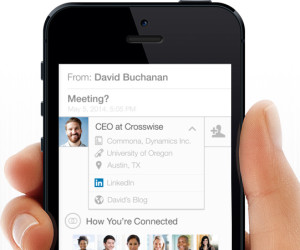 Some people think a lot can go wrong if you have your emails pass through LinkedIn’s servers with the company’s new Intro technology.
Some people think a lot can go wrong if you have your emails pass through LinkedIn’s servers with the company’s new Intro technology.
Earlier this week, the company released LinkedIn Intro, a plug-in for the iPhone’s native email app that attaches people’s LinkedIn profile information to their emails. The service is meant to add more professional context to emails, but it does that at the expense of users’ private data, some security experts say.
By transmitting sent and received emails through LinkedIn’s servers, which then scrape and analyse them for data, the service essentially amounts to a “man-in-the-middle attack,” security consulting firm Bishop Fox wrote in a staff blog post.
“The introduction of new data sources into a medium rife with security issues such as email is a dream for attackers,” Bishop Fox wrote, noting that it could only be a matter of time before someone uses the service to launch a phishing attack.
The concept of being watched online, in an age of targeted advertising, cookies, geolocation data and the National Security Agency, is not new. But in trying to embed LinkedIn profile information into people’s email, the company looks at too much information, said Carl Livitt, managing securities associate at Bishop Fox. “The company used a massive hammer to crack an egg,” Livitt said.
For online attackers, Intro makes LinkedIn a juicy target, he said.
LinkedIn maintains a privacy policy for the service, which states that each piece of data is encrypted with a key that is unique to the user and his device. “The servers themselves are secured and monitored 24/7 to prevent any unauthorised access,” it says.
Though LinkedIn doesn’t say that it decrypts emails while they’re on the servers in order to make modifications and attach people’s profile information, that’s what’s happening, Livitt said.
But some other observers don’t think Intro raises any new security issues. “It’s the same situation as every other cloud service provider,” including Google, Yahoo, AOL and many others, said security expert and author Bruce Schneier. “You have to trust them.”
“It’s just another company … in it for the money,” he said. “Before, it was 1,000 companies you had to trust – now it’s 1,001.”
LinkedIn may already be walking on thin ice when it comes to data security. The company suffered a major breach of its password database last year, which saw millions of hashed passwords appear in an online forum in Russia.
In a statement, a LinkedIn spokeswoman said the company takes the privacy and security of its members’ data seriously, and that it has “taken a thoughtful approach to ensure we’ve put the right security precautions in place for the LinkedIn Intro product.”
If the security risks are real, is the service that Intro provides worth it? That comes down to being a personal choice, Bishop Fox’s Livitt said, but for him the answer is “no.”
“I would not recommend Intro to any of my clients,” he said.





